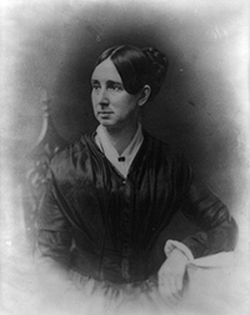 Dorothea Dix. (Photo Source: U.S. Library of Congress.) Dorothea Dix. (Photo Source: U.S. Library of Congress.) Dorothea Dix was an 18th century educator and social reformist. Though born into a struggling family without much money, Dix went on to champion for the mentally ill and prisoners as well as female nurses during the Civil War. Her efforts resulted in international reform Early on In 1802, Dorothea Dix was born in Maine to Joseph Dix, a constantly traveling Methodist preacher who struggled with alcoholism and depression. Despite this, Joseph taught his daughter to read and write -- skills Dix remained passionate about throughout her life. When Dix reached the age of 12, she moved to Massachusetts. First living in Boston with her grandmother, followed by living with her aunt in Worcester. At 14, Dix began to teach and three years later, in 1819, she founded Dix Mason, a girls school in Boston. Only a teenager, Dix created her own curriculum, continued to write and, in 1824, she published her most well known textbook, Conversations of Common Things. Helping the Mentally Ill In 1841, Dix started teaching Sunday school at a women’s prison in East Cambridge. Appalled by the treatment of prisoners, especially those who were mentally ill, Dix set out to do something. She witnessed prisoners not only living without heat, but also saw brutally violent acts such as flogging, whipping and chaining. Impassioned to change their situations, Dix presented her findings and argued with the Massachusetts legislature for reform. As a result, additional budget was granted to the state’s mental hospital. But Dix didn’t stop with reforms in Mass. She went on to campaign for change in multiple states like New York, Rhode Island, Pennsylvania and Indiana as well as in Europe. Civil War Service Dix was appointed Superintendent of Women Nurses in 1861. In the role, she managed setting up Union Army field hospitals, overseeing and recruiting an immense staff and more. Dix was the first federally appointed woman to serve such a role. Dix’s efficiency was appreciated, but the rigid manner in which she conducted business conflicted with other nurses and military leaders. As a result, in 1863, Dix was relieved of her duties. Later Life Post Civil War, Dix continued advocating for others and remained a steadfast champion for the mentally ill. In 1887, Dix contracted malaria and died at 85 years old in a Trenton, New Jersey hospital she helped establish 40 years prior. Dix once wrote, “I think even lying on my bed I can still do something.” And, it’s clear, Dix never let sleep get in the way; her steadfast work ethic and passion to help others served as a catalyst for paramount reforms. ~Lisa Zimmermann
0 Comments
Your comment will be posted after it is approved.
Leave a Reply. |
Archives
July 2017
Categories
All
|
 RSS Feed
RSS Feed